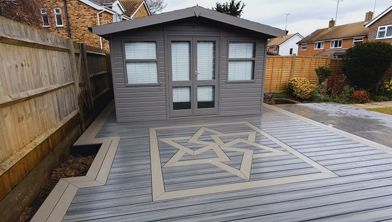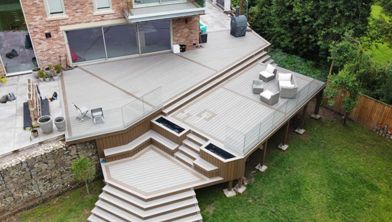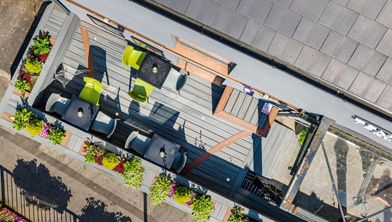Materials & Costs For Building An Above Ground Pool Deck
Whether you’re thinking about purchasing a new above-ground pool or adding a deck around an existing pool, there’s more to consider than just aesthetics. You’ll also want to investigate factors such as cost, longevity and safety.
In this article, we’ll help you get a feel for how much an above-ground pool deck will cost, as well as offer tips to make sure your structure is safe, sturdy and long-lasting.
How Much Does It Cost to Build an Above-Ground Pool Deck?
There are many design options to consider when building an above-ground pool deck. Similarly, several variables can alter the costs associated with building a pool deck, including the type of materials used, size of the deck, local building codes requirements and the cost of labour if you hire a contractor.
The average cost of an above-ground pool deck ranges between $4,700 and $7,800. Costs vary depending on geographic region, time of year and whether you build it yourself or hire a professional.
To get a better idea of what the above-ground pool deck of your dreams may cost, check out our deck cost calculator and explore your options.
How to Choose Pool Deck Materials
You have a couple of suitable options when selecting the best material for your pool deck. Pressure-treated timber is the least-expensive choice upfront, but pressure-treated timber can be more costly in the long run due to high maintenance requirements and regular repairs, unlike composite material which has fewer ongoing maintenance requirements.. For an above-ground pool deck, consider composite decking such as Trex® decking for long-lasting durability with minimal maintenance requirements. We recommend you look for above-ground deck materials that:
#1: Resists Mould
Suffice it to say, your above-ground pool deck will come in contact with a lot of water, which is a breeding ground for mould. Opt for a composite material that is mould-resistant to reduce the care & cleaning required.
#2: Resists Rotting, Warping, & Splintering
timber has a tendency to rot, warp, and splinter over time. Trex® composite decking may have a higher up-front investment for the average cost of an above-ground pool deck but will save you time, money and peace of mind in the long run.
#3: Match Your House
With more than 20 colours in its three decking collections, Trex® composite decking comes in a variety of browns, reds and greys that will complement and match your home's colour, whether brick, siding or masonry.
Best Materials for Above-Ground Pool Decks
When it comes to building an above-ground pool deck, there are some commonly used materials. But choosing which is the best pool deck material for your unique needs is crucial.
Trex® composite Decking for Above-Ground Pool Decks
There are a number of reasons that composite decking is such a popular and smart choice for an above-ground pool deck. Trex® composite decking is a sustainably sourced material, made from 95% recycled plastic and reclaimed timber. It’s made with an earth-friendly manufacturing process which reclaims factory waste, and no harmful chemicals, such as VOCs, are used to make the boards.
Trex® decking has several advantages over the competition. It doesn't require annual painting, sealing, or staining. It resists rotting, warping, splinters and weather-related cracking, which is critical since your deck will be in the thick of all the splashing action in the pool. Trex® composite decking is also stain-, fade- and insect-resistant, which will keep your deck looking like new despite prolonged exposure to sun.
PVC Decking for Above-Ground Pool Decks
PVC decking is another popular choice for above-ground pool decks. Like composite, it’s resistant to rot, and mildew due to its all-synthetic composition that lacks absorbency. However, there are a few differences between PVC decking and composite. Because it’s non-absorbent, PVC decking can be slippery. This can pose a potential hazard when there’s a lot of splashing, playing, and running on an above-ground pool deck.
Another drawback of plastic decking is that some untreated PVC products can peel or fade over time, diminishing the attractiveness of your deck. Although PVC doesn’t require the regular maintenance of timber, it can splinter or crack under cold temperatures. This is something to be mindful of if you live in a colder climate and don’t want a disappointing surprise when you open your pool for the summer.
timber Decking for Above-Ground Pool Decks
timber has long been a go-to for building above-ground pool decks. Many installers and homeowners look to timber as a solid option. While different types of timber have different strengths, it’s a high-maintenance material that requires seasonal upkeep.
timber doesn’t get as hot as PVC and composites when in direct sunlight, however, while you won’t get a case of hot foot when walking barefoot on your deck, you may get a splinter since timber can warp and splinter over time. When comparing it to composite pool decking like Trex, timber is subject to moisture-related rot, fading, and staining from exposure to pool chemicals. This can make your above-ground pool deck look worn and aged before its time, unless you submit to a regular regimen of sealing and power washing. In addition to being vulnerable to the elements, timber is also prey to termites and insect infestation, unlike composites, which can compromise the structural integrity of your deck.
Pool Deck Maintenance Tips for a Trex® composite Deck
With Trex® decking, long-term maintenance is a cinch compared to timber. All that’s needed is a simple, periodic soap-and-water cleaning or a gentle pressure wash (less than 3100 psi). This will keep your above-ground pool deck looking great year-round. Another maintenance tip for pool decks is do not leave spilt pool chemicals on the decking surface for long periods of time. While in most cases it would not harm the decking, it’s best to remove and clean these areas if this occurs.
When using a pressure washer, spray your above-ground pool deck with soap. Follow with a soft-bristle brush on each individual deck board. Then finish with a rinse on the pressure washer. Do not get the nozzle of the pressure washer closer than 8 inches away from the board for best results.
Check out the Trex owner's care and cleaning guide for more details on how to get the most out of your above-ground pool deck.
This content was partially or fully generated by AI and has been reviewed by our team to ensure accuracy and relevance.




































